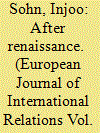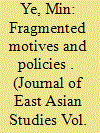|
|
|
Sort Order |
|
|
|
Items / Page
|
|
|
|
|
|
|
| Srl | Item |
| 1 |
ID:
110828


|
|
|
|
|
| Publication |
2012.
|
| Summary/Abstract |
Why does a re-emerging China pursue institutional strategies to expand its multilateral ties all over the world? This study explains the genesis of China's new multilateral diplomacy toward Africa, Latin America, and the Middle East. The central argument of the study is that many strands of structural arguments drawn from realist, liberal, and constructivist insights cannot provide complete explanations about China's multilateral activism without recourse to cognitive feedback dynamics. China fed its regional experiences of multilateralism back into its global policy formation. This experiment-based approach has been a pervasive feature in Chinese multilateral diplomacy as well as Chinese domestic reforms during the post-Mao period. The cognitive feedback model developed in this study intends to complement the prominent structural explanations by identifying micro-level dynamics and seeks to contribute to today's debate over power transition and international order.
|
|
|
|
|
|
|
|
|
|
|
|
|
|
|
|
| 2 |
ID:
125620


|
|
|
|
|
| Publication |
2013.
|
| Summary/Abstract |
This paper analyzes the effects of providing feedback on electricity consumption in a field trial involving more than 1500 households in Linz, Austria. About half of these households received feedback together with information about electricity-saving measures (pilot group), while the remaining households served as a control group. Participation in the pilot group was random, but households were able to choose between two types of feedback: access to a web portal or written feedback by post. Results from cross section OLS regression suggest that feedback provided to the pilot group corresponds with electricity savings of around 4.5% for the average household. Our results from quantile regressions imply that for households in the 30th to the 70th percentile of electricity consumption, feedback on electricity consumption is statistically significant and effects are highest in absolute terms and as a share of electricity consumption. For percentiles below or above this range, feedback appears to have no effect. Finally, controlling for a potential endogeneity bias induced by non random participation in the feedback type groups, we find no difference in the effects of feedback provided via the web portal and by post.
|
|
|
|
|
|
|
|
|
|
|
|
|
|
|
|
| 3 |
ID:
181838


|
|
|
|
|
| Summary/Abstract |
Observers have portrayed the Belt and Road Initiative (BRI) variously, as China's great-power strategy, global infrastructure initiative, or commercial projects. Each characterization has had logical reasoning and evidence to support it. But how? How has one initiative been shown to have such varied motives? This article unpacks the Chinese state and establishes that a “tri-block” structure consisting of political leadership, bureaucracy, and economic arms has accounted for such varied motivations and actors in the BRI in China. In the BRI process, the leadership employed strategic rhetoric, and bureaucracies imposed policy ideas. Yet, more pervasively, the implementers have followed commercial motives in specific projects. BRI's strategic rhetoric and hazardous investment have generated external critiques and anti-China backlash, forcing Beijing to readjust the initiative. However, given the tri-block state structure, Beijing's policy adjustment will not be sufficient. Economic actors’ incentives need to be shifted too.
|
|
|
|
|
|
|
|
|
|
|
|
|
|
|
|
| 4 |
ID:
068416


|
|
|
| 5 |
ID:
125768


|
|
|
|
|
| Publication |
2013.
|
| Summary/Abstract |
Despite national plans to deploy smart meters in small and medium businesses in the UK, there is little knowledge of occupant energy use in offices. The objectives of the study were to investigate the effect of individual feedback on energy use at the workdesk, and to test the relationship between individual determinants, energy use and energy reduction. A field trial is presented, which monitored occupant energy use and provided individual feedback to 83 office workers in a university. The trial comprised pre- and post-intervention surveys, energy measurement and provision of feedback for 18 weeks post-baseline, and two participant focus groups. The main findings were: statistically significant energy reduction was found, but not for the entire measurement period; engagement with feedback diminished over time; no measured individual variables were related to energy reduction and only attitudes to energy conservation were related to energy use; an absence of motivation to undertake energy reduction actions was in evidence. The implications for energy use in offices are considered, including the need for motivations beyond energy reduction to be harnessed to realise the clear potential for reduced energy use at workdesks.
|
|
|
|
|
|
|
|
|
|
|
|
|
|
|
|
| 6 |
ID:
098685


|
|
|
|
|
| Publication |
2010.
|
| Summary/Abstract |
This paper explores how UK householders interacted with feedback on their domestic energy consumption in a field trial of real-time displays or smart energy monitors. After examining relevant bodies of literature on the effects of energy feedback on consumption behaviour, and on the complex role of energy and appliances within household moral economies, the paper draws on qualitative evidence from interviews with 15 UK householders trialling smart energy monitors of differing levels of sophistication. It focuses specifically on householder motivations for acquiring the monitors, how the monitors have been used, how feedback has changed consumption behaviour, and the limitations to further behavioural change the householders experienced. The paper concludes by identifying significant implications for future research and policy in this area.
|
|
|
|
|
|
|
|
|
|
|
|
|
|
|
|
| 7 |
ID:
174987


|
|
|
|
|
| Summary/Abstract |
Behavioral interventions have been shown to be valuable instruments in reducing energy use among ratepaying customers, but their effect on non-ratepayers has received less attention. This study uses a randomized controlled trial research design to examine the effect of feedback and a social nudge in the form of peer comparison on energy consumption of non-ratepaying households. The study setting is a university family housing complex, and findings are based on hourly observations of energy use by 62 households over thirteen weeks. Our results suggest that neither feedback or peer comparison is an effective instrument to reduce energy use of non-ratepaying households, and may even increase energy consumption in some contexts. We find heterogeneous effects among households that are low and high users of energy in the pre-treatment period, with high users increasing energy consumption in response to feedback. Thus, caution is needed in applying behavioral interventions when financial incentives to reinforce intended effects are absent.
|
|
|
|
|
|
|
|
|
|
|
|
|
|
|
|
| 8 |
ID:
137688


|
|
|
|
|
| Summary/Abstract |
With smart metering initiatives gaining increasing global popularity, the present paper seeks to challenge the increasingly entrenched view that providing householders with feedback about their energy usage, via an in-home-display, will lead them to substantially reduce their energy consumption. Specifically, we draw on existing quantitative and qualitative evidence to outline three key problems with feedback, namely: (a) the limited evidence of efficacy, (b) the need for user engagement, and (c) the potential for unintended consequences. We conclude by noting that, in their current form, existing in-home-displays may not induce the desired energy-reduction response anticipated by smart metering initiatives. Instead, if smart metering is to effectively reduce energy consumption there is a clear need to develop and test innovative new feedback devices that have been designed with user engagement in mind.
|
|
|
|
|
|
|
|
|
|
|
|
|
|
|
|
| 9 |
ID:
166978


|
|
|
|
|
| Summary/Abstract |
The Eco-Home Diagnosis program was introduced to promote energy-saving actions in Japanese households. However, to date, no study has examined whether it contributes to actual energy reduction while evaluating psychological factors that lead to energy-saving actions by participants. Hence, this paper reports on a case study in Fukuoka Prefecture that evaluated these effects. The findings revealed that 33 participants performed 3.3 energy-saving actions on average. They opted primarily for curtailment actions, but these had a small impact on electricity use relative to efficiency actions, which require high initial costs. The analysis of factors determining participants’ energy-saving actions showed that, before the program, behavioral intentions were influenced by cost–benefit evaluations. However, this changed after the program: Their interest was raised by perceived effectiveness, and this was seen to be linked to their motivation and behavioral intentions. It is recommended that enhancement of the perceived effectiveness should be further considered during the diagnosis process, while more feedback by advisors is needed to keep participants aware of energy-saving actions. The program is likely to be more effective if it targets those who are planning to build or renovate their homes.
|
|
|
|
|
|
|
|
|
|
|
|
|
|
|
|
|
|
|
|
|